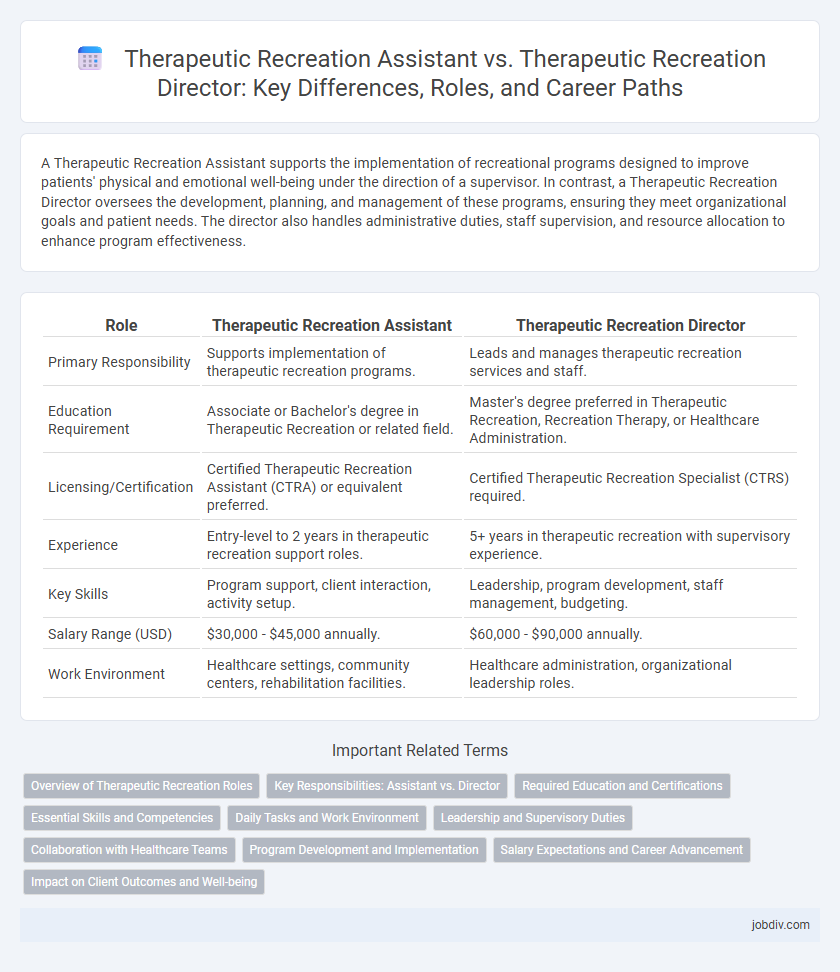A Therapeutic Recreation Assistant supports the implementation of recreational programs designed to improve patients' physical and emotional well-being under the direction of a supervisor. In contrast, a Therapeutic Recreation Director oversees the development, planning, and management of these programs, ensuring they meet organizational goals and patient needs. The director also handles administrative duties, staff supervision, and resource allocation to enhance program effectiveness.
Table of Comparison
| Role | Therapeutic Recreation Assistant | Therapeutic Recreation Director |
|---|---|---|
| Primary Responsibility | Supports implementation of therapeutic recreation programs. | Leads and manages therapeutic recreation services and staff. |
| Education Requirement | Associate or Bachelor's degree in Therapeutic Recreation or related field. | Master's degree preferred in Therapeutic Recreation, Recreation Therapy, or Healthcare Administration. |
| Licensing/Certification | Certified Therapeutic Recreation Assistant (CTRA) or equivalent preferred. | Certified Therapeutic Recreation Specialist (CTRS) required. |
| Experience | Entry-level to 2 years in therapeutic recreation support roles. | 5+ years in therapeutic recreation with supervisory experience. |
| Key Skills | Program support, client interaction, activity setup. | Leadership, program development, staff management, budgeting. |
| Salary Range (USD) | $30,000 - $45,000 annually. | $60,000 - $90,000 annually. |
| Work Environment | Healthcare settings, community centers, rehabilitation facilities. | Healthcare administration, organizational leadership roles. |
Overview of Therapeutic Recreation Roles
A Therapeutic Recreation Assistant supports the implementation of recreation programs designed to improve patients' physical, emotional, and social well-being under the supervision of a Therapeutic Recreation Director. The Therapeutic Recreation Director oversees program development, staff management, and strategic planning to ensure effective therapeutic outcomes. Both roles are essential for promoting patient engagement and enhancing quality of life through tailored recreational activities.
Key Responsibilities: Assistant vs. Director
Therapeutic Recreation Assistants implement individualized recreational therapy plans under the supervision of the director, facilitating group activities and assisting clients with adaptive equipment to improve physical, mental, and emotional well-being. Therapeutic Recreation Directors develop and oversee comprehensive recreational therapy programs, manage staff, coordinate client care plans, and ensure compliance with healthcare regulations and standards. While assistants focus on direct client interaction and activity execution, directors prioritize program development, administrative leadership, and strategic planning within therapeutic recreation settings.
Required Education and Certifications
Therapeutic Recreation Assistants typically require an associate degree or certification in therapeutic recreation or a related field, with certifications such as the Certified Therapeutic Recreation Assistant (CTRA) enhancing job prospects. In contrast, Therapeutic Recreation Directors generally need a bachelor's or master's degree in therapeutic recreation, recreation therapy, or health sciences, along with Certified Therapeutic Recreation Specialist (CTRS) credentials. Both roles often mandate CPR and first aid certification, but directors usually hold additional leadership training or management certifications.
Essential Skills and Competencies
Therapeutic Recreation Assistants demonstrate essential skills such as patient communication, activity facilitation, and basic therapeutic techniques to support individualized treatment plans effectively. Therapeutic Recreation Directors require advanced competencies including program development, staff management, strategic planning, and in-depth knowledge of recreational therapy principles to oversee comprehensive therapeutic services. Both roles emphasize a strong foundation in empathy, patient-centered care, and adaptability within therapeutic recreational environments.
Daily Tasks and Work Environment
Therapeutic Recreation Assistants support clients by facilitating recreational activities, monitoring safety, and documenting progress under the supervision of directors, often working directly in clinical or community settings. Therapeutic Recreation Directors oversee program development, staff management, and budget planning while ensuring compliance with healthcare regulations, typically operating in administrative offices or healthcare facilities. Both roles require collaboration with healthcare professionals, but assistants engage more in hands-on client interaction, whereas directors focus on strategic planning and team leadership.
Leadership and Supervisory Duties
Therapeutic Recreation Directors oversee program development, strategic planning, and team leadership, ensuring the delivery of effective therapeutic recreation services. Therapeutic Recreation Assistants support implementation under supervision, assisting clients directly while adhering to established treatment plans. Directors hold primary responsibility for staff supervision, goal setting, and compliance with regulatory standards, driving service quality and organizational outcomes.
Collaboration with Healthcare Teams
Therapeutic Recreation Assistants work closely with healthcare professionals to implement recreational therapy plans tailored to individual patient needs, ensuring effective support during treatment. Therapeutic Recreation Directors oversee interdisciplinary collaboration by coordinating between healthcare teams, therapists, and support staff to design comprehensive therapeutic programs. Their leadership fosters consistent communication, optimizing patient outcomes through integrated recreational therapy services.
Program Development and Implementation
Therapeutic Recreation Assistants support program development and implementation by assisting with activity planning, facilitating participant engagement, and monitoring progress under the guidance of the Therapeutic Recreation Director. The Therapeutic Recreation Director oversees the design, coordination, and evaluation of therapeutic recreation programs, ensuring they meet clinical objectives and regulatory standards. Directors also lead staff training and resource allocation to optimize program outcomes and community impact.
Salary Expectations and Career Advancement
Therapeutic Recreation Assistants typically earn a starting salary ranging from $30,000 to $45,000 annually, while Therapeutic Recreation Directors can expect salaries between $60,000 and $90,000, reflecting higher qualifications and leadership roles. Career advancement for Assistants often involves gaining certification and experience to transition into supervisory or specialist positions, ultimately leading to Director roles with greater responsibility for program management and strategic planning. Directors oversee entire therapeutic recreation programs, requiring advanced skills in budgeting, staff supervision, and policy development, which correspond to their higher salary and leadership status.
Impact on Client Outcomes and Well-being
Therapeutic Recreation Assistants provide direct support and hands-on activities that promote client engagement, socialization, and physical rehabilitation, significantly enhancing individual well-being and recovery progress. Therapeutic Recreation Directors focus on program development, staff supervision, and outcome evaluation, ensuring tailored interventions that improve overall client satisfaction and long-term health outcomes. Both roles collaboratively contribute to optimizing therapeutic recreation services, with assistants affecting immediate client experiences and directors shaping strategic impact on holistic wellness.
Therapeutic Recreation Assistant vs Therapeutic Recreation Director Infographic

 jobdiv.com
jobdiv.com